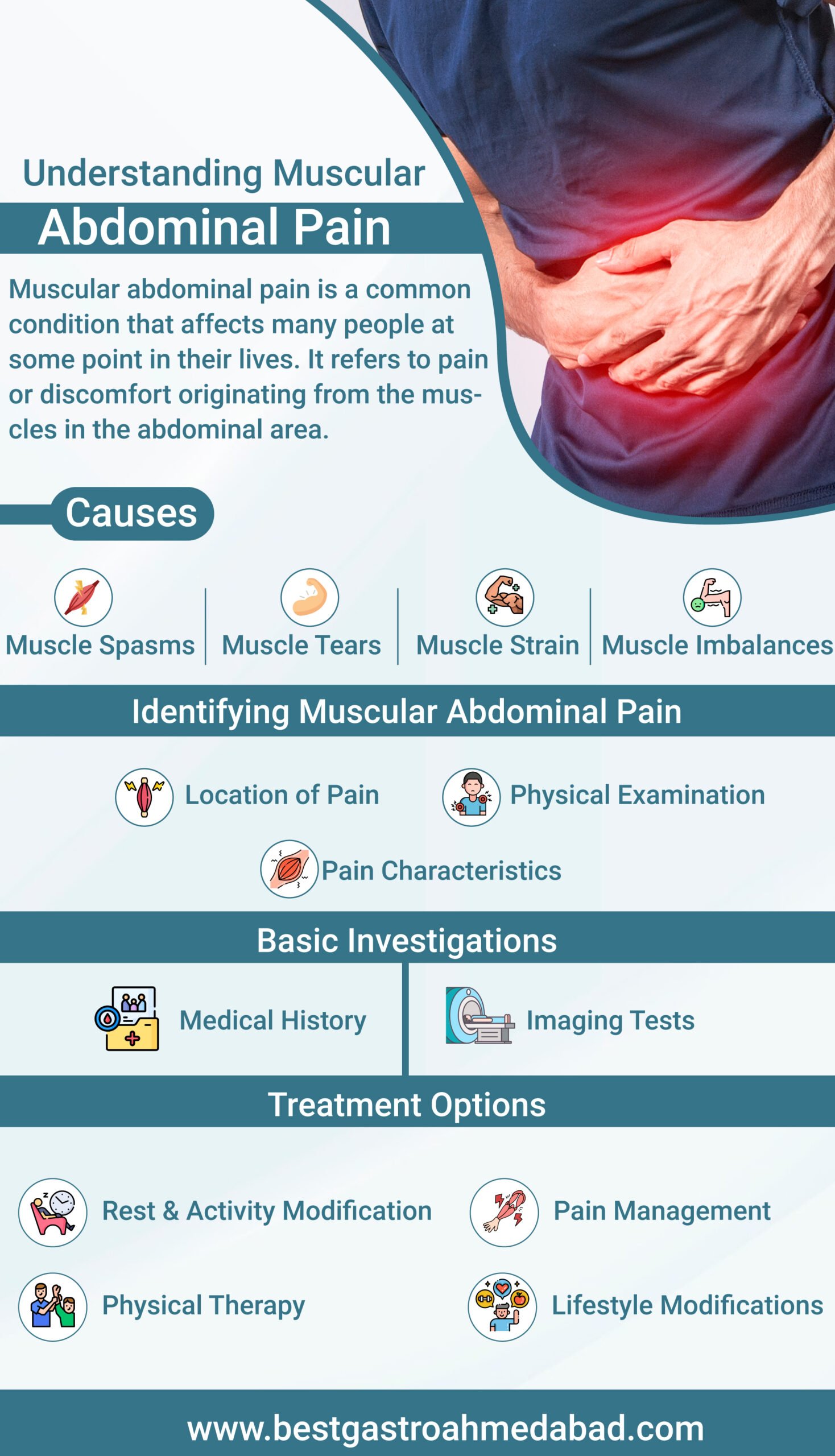Understanding Muscular Abdominal Pain: Causes, Identification, and Treatment

Muscular abdominal pain is a common condition that affects many people at some point in their lives. It refers to pain or discomfort originating from the muscles in the abdominal area. While it can be distressing, understanding its causes, identifying the symptoms, and seeking appropriate treatment can help alleviate the pain and discomfort. In this article, we will explore the various aspects of muscular abdominal pain, including its causes, identification, basic investigations, and treatment options.
Causes of Muscular Abdominal Pain
Muscle Strain: Overexertion, excessive physical activity, or sudden movements can strain the abdominal muscles, leading to pain and discomfort. Examples include lifting heavy objects or engaging in intense exercise without proper warm-up.
Muscle Spasms: Involuntary contractions or spasms of the abdominal muscles can result in sharp, cramp-like pain. Dehydration, electrolyte imbalances, or muscle fatigue may contribute to muscle spasms.
Muscle Tears: Injury or trauma to the abdominal muscles, such as a direct blow or a sports-related injury, can cause muscle tears. This can lead to localized pain and tenderness.
Muscle Imbalances: Weak or imbalanced abdominal muscles can put excessive strain on certain areas, leading to pain. Poor posture, sedentary lifestyle, or improper exercise techniques can contribute to muscle imbalances.
Identifying Muscular Abdominal Pain
Location of Pain: Muscular abdominal pain is often localized and can vary in intensity. It may be felt in specific regions of the abdomen, such as the upper or lower abdomen, and sometimes radiate to the back or sides.
Pain Characteristics: Muscular pain is typically described as a dull ache, cramping, or soreness. The pain may worsen with movement or certain activities and subside with rest.
Physical Examination: A healthcare professional may conduct a physical examination to assess the abdominal muscles for tenderness, swelling, or signs of injury.
Basic Investigations
Medical History: A detailed medical history helps identify potential causes of muscular abdominal pain, such as recent physical activities, injuries, or underlying medical conditions.
Imaging Tests: In some cases, imaging tests like ultrasound or magnetic resonance imaging (MRI) may be recommended to evaluate the abdominal muscles, identify any tears or abnormalities, and rule out other possible causes of pain.
Treatment Options
Rest and Activity Modification: Giving the abdominal muscles adequate rest and avoiding activities that exacerbate the pain can help in the healing process. Gradually reintroducing gentle stretching and strengthening exercises can promote muscle recovery.
Pain Management: Over-the-counter pain relievers, such as acetaminophen or non-steroidal anti-inflammatory drugs (NSAIDs), can be used to alleviate pain and reduce inflammation. However, it is important to consult a healthcare professional before taking any medication.
Physical Therapy: A physical therapist can provide targeted exercises and stretches to strengthen the abdominal muscles, improve flexibility, and correct muscle imbalances. They may also use techniques like heat or cold therapy, ultrasound, or electrical stimulation to reduce pain and promote healing.
Lifestyle Modifications: Adopting a healthy lifestyle, including regular exercise, proper posture, and maintaining a balanced diet, can contribute to the overall well-being of the abdominal muscles.
Conclusion
Muscular abdominal pain can be uncomfortable and limit daily activities. By understanding its causes, recognizing the symptoms, and seeking appropriate treatment, individuals can effectively manage and alleviate the pain. Remember, if you experience persistent or severe abdominal pain, it is essential to consult a healthcare professional for a proper diagnosis and guidance on the most suitable treatment options for your specific condition.
If you are experiencing abdominal pain, it is recommended that you visit a gastroenterologist. Dr. Vatsal Mehta at Alfa Gastro & Liver Care Hospital in Ahmedabad is a trusted specialist in the field. To receive the necessary medical attention, please book an appointment with Dr. Vatsal Mehta at your earliest convenience.

